Koninklijke Philips Electronics N.V. (Royal Philips Electronics, commonly known as Philips) (Euronext: PHIA, NYSE: PHG) is a Dutch multinational electronics company headquartered in Amsterdam. It was founded in Eindhoven in 1891 by Gerard Philips and his father Frederik. It is one of the largest electronics companies in the world and employs around 122,000 people across more than 60 countries.
Philips is organized into three main divisions: Philips Consumer Lifestyle (formerly Philips Consumer Electronics and Philips Domestic Appliances and Personal Care), Philips Healthcare (formerly Philips Medical Systems) and Philips Lighting. As of 2012 Philips is the largest manufacturer of lighting in the world.
Philips has a primary listing on the Euronext Amsterdam stock exchange and is a constituent of the AEX index. It has a secondary listing on the New York Stock Exchange.
History
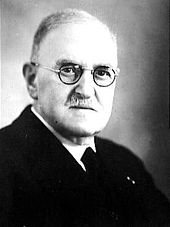
Gerard Philips
The Philips Company was founded in 1891 by Gerard Philips and his father Frederik. Frederik, a banker based in Zaltbommel, financed the purchase and setup of a modest, empty factory building in Eindhoven, where the company started the production of carbon-filament lamps and other electro-technical products in 1892. This first factory has been adapted and is used as a Museum devoted to light sculpture
In 1895, after a difficult first few years and near bankruptcy, the Philipses brought in Anton, Gerard's younger brother by sixteen years. Though he had earned a degree in engineering, Anton started work as a sales representative; soon, however, he began to contribute many important business ideas. With Anton's arrival, the family business began to expand rapidly, resulting in the founding of Philips Metaalgloeilampfabriek N.V. (Philips Metal Filament Lamp Factory Inc.) in Eindhoven in 1907, followed in 1912 by the foundation of Philips Gloeilampenfabrieken N.V. (Philips Lightbulb Factories Inc.). After Gerard and Anton Philips changed their family business by founding the Philips incorporation, they laid the foundations for the later electronics multinational.
In the 1920s, the company started to manufacture other products, such as vacuum tubes. In 1939 they introduced their electric razor, the Philishave (marketed in the USA using the Norelco brand name). The "Chapel" is a radio with built-in loudspeaker, which was designed during the early 1930s.
AcquisitionsCompanies acquired by Philips through the years include Amperex, Magnavox, Signetics, Mullard, VLSI, Agilent Healthcare Solutions Group, Marconi Medical Systems, ADAC Laboratories, ATL Ultrasound, portions of Westinghouse and the consumer electronics operations of Philco and Sylvania. Philips abandoned the Sylvania trademark which is now owned by Havells Sylvania except in Australia, Canada, Mexico, New Zealand, Puerto Rico and the USA where it is owned by the Osram unit of Siemens. Formed in November 1999 as an equal joint venture between Philips and Agilent Technologies, the light-emitting diode manufacturer Lumileds became a subsidiary of Phillips Lighting in August 2005 and a fully owned subsidiary in December 2006.
Operations
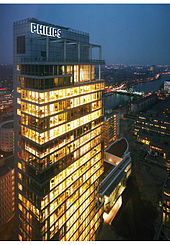
The current Philips world headquarters in Amsterdam, Netherlands
Philips is registered in the Netherlands as a naamloze vennootschap and has its world headquarters in Amsterdam. At the end of 2011 Philips had 124 manufacturing facilities across 26 countries and sales and service operations in around 100 countries.
Philips is organized into three main divisions: Philips Consumer Lifestyle (formerly Philips Consumer Electronics and Philips Domestic Appliances and Personal Care), Philips Healthcare (formerly Philips Medical Systems) and Philips Lighting. Philips achieved total revenues of €22.579 billion in 2011, of which €8.852 billion were generated by Philips Healthcare, €7.638 billion by Philips Lighting, €5.823 billion by Philips Consumer Lifestyle and €266 million from group activities. At the end of 2011 Philips had a total of 121,888 employees, of whom around 44% were employed in Philips Lighting, 31% in Philips Healthcare and 15% in Philips Consumer Lifestyle.
Philips invested a total of €1.61 billion in research and development in 2011, equivalent to 7.1% of sales. Philips Intellectual Property and Standards is the group-wide division responsible for licensing, trademark protection and patenting. Philips currently holds around 54,000 patent rights, 39,000 trademarks, 70,000 design rights and 4,400 domain name registrations.Australia/New Zealand
Philips Australia was founded in 1927 and is headquartered in North Ryde, New South Wales and also runs the New Zealand operation from there. The company currently employs around 800 people. Regional sales and support offices are located in Melbourne, Brisbane, Adelaide and Perth.
Current activities include: Philips Healthcare (also responsible for New Zealand operations); Philips Lighting (also responsible for New Zealand operations); Philips Consumer Lifestyle (also responsible for New Zealand operations); Philips Dictation Systems; Philips Home Healthcare (formerly Respironics, with its national network of Sleep Easy Centres); and Philips Dynalite (Lighting Control systems, acquired in 2009, global design and manufacturing centre).
Brazil
Philips do Brasil was founded in 1924 Rio de Janeiro. In 1929, Philips started to sell radio receivers. In the 1930s, Philips was making its light bulbs and radio receivers in Brazil. From 1939 to 1945, World War II forced Brazilian branch of Philips to sell bicycles, refrigerators and insecticides. After the war, Philips had a great industrial expansion in Brazil,and was among first groups to establish in Manaus Free Zone. In the 1970s, Philips Records was a major player in Brazil recording industry. Nowadays, Philips do Brasil is one of the largest foreign-owned companies in Brazil.
Canada
Philips Canada was founded in 1934. It is well known in medical systems for diagnosis and therapy, lighting technologies, shavers, and consumer electronics.
The Canadian headquarters are located in Markham, Ontario.
For several years, Philips manufactured lighting products in two Canadian factories. The London, Ontario, plant opened in 1971. It produced A19 lamps (including the "Royale" long life bulbs), PAR38 lamps and T19 lamps (originally a Westinghouse lamp shape). Philips closed the factory in May, 2003. The Trois-Rivières, Quebec plant was a Westinghouse facility which Philips continued to run it after buying Westinghouse's lamp division in 1983. Philips closed this factory a few years later, in the late 1980s.
Mainland China
In early 2008 Philips Lighting, a division of Royal Philips Electronics, opened a small engineering center to adapt the company's products to vehicles in Asia.
France
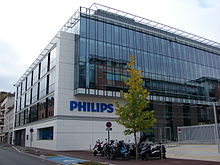
The headquarters of Philips France in Suresnes
Philips France has its headquarters in Suresnes. The company employs over 3600 people nationwide.
Philips Lighting has manufacturing facilities in Chalon-sur-Saône (fluorescent lamps), Chartres (automotive lighting), Lamotte-Beuvron (architectural lighting by LEDs and professional indoor lighting), Longvic (lamps), Miribel (outdoor lighting), Nevers (professional indoor lighting).
Greece
Philips' Greece is headquartered in Marousi, Athens. As of 2012 Philips has no manufacturing plants in Greece, although there have been in the past.
Hong Kong
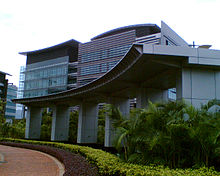
The Philips building in the Hong Kong Science Park
Philips Hong Kong began operation in 1948. Philips Hong Kong houses the global headquarters of Philips' Audio Business Unit. It also house Philip's Asia Pacific regional office and headquarters for its Design Division, Domestic Appliances & Personal Care Products Division, Lighting Products Division and Medical System Products Division.
Philips also has a Light Factory in Hong Kong, with 11 automatic production lines installed which is capable of producing 200 million pieces a year. The Philips Light Factory was established in 1974, now certified with ISO 9001:2000 & ISO 14001, its product portfolio ranges from Prefocus, Lensend to E10 miniature light bulbs.
India
Philips began operations in India in 1930 with the establishment of Philips Electrical Co. (India) Pvt Ltd in Kolkata (Calcutta) as a sales outlet for imported Philips lamps. In 1938, Philips established its first Indian lamp-manufacturing factory in Kolkata. In 1948, Philips started manufacturing radios in Kolkata. In 1959, a second radio factory was established near Pune. In 1957, the company converted into a public limited company, renamed "Philips India Ltd". In 1970 a new consumer electronics factory began operations in Pimpri near Pune; the factory was closed in 2006. In 1996, the Philips Software Centre was established in Bangalore (now renamed the Philips Innovation Campus). In 2008, Philips India entered the water purifier market.
Israel
Philips has been active in Israel since 1948 and in 1998 set-up a wholly owned subsidiary, Philips Electronics (Israel) Ltd. The company has 600 employees in Israel and generated sales of over $300 million in 2007.
- Philips Medical Systems Technologies Ltd. (Haifa) is a developer and manufacturer of Computerized Tomography (CT), diagnostic and Medical Imaging systems. The company was founded in 1969 as Elscint by Elron Electronic Industries and was acquired by Marconi Medical Systems in 1998, which was itself acquired by Philips in 2001.
- Philips Semiconductors Israel, now part of NXP Semiconductors
Mexico
Philips Mexicana SA de CV is headquartered in Mexico City. Philips Lighting has manufacturing facilities in:Monterrey, Nuevo León; Ciudad Juárez, Chihuahua; and Tijuana, Baja California. Philips Consumer Electronics has a manufacturing facility in Ciudad Juárez, Chihuahua. Philips Domestic Appliances formerly operated a large factory in the Industrial Vallejo sector of Mexico City but this was closed in 2004.
Pakistan
Philips has been active in Pakistan since 1948 and has a wholly owned subsidiary, Philips Electrical industries of Pakistan Limited.
It has manufacturing in Karachi and two regional sales offices in Lahore and Rawalpindi.
Poland
Philips' operations in Poland include: a European financial and accounting centre in Łódź; Philips Lighting facilities in Bielsko-Biała, Pabianice, Piła, and Kętrzyn; and a Philips Domestic Appliances facility in Białystok.
United Kingdom
Philips UK has its headquarters in Guildford, Surrey. The company employs over 2500 people nationwide.
United States
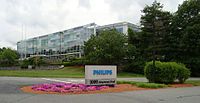
Philips' North American headquarters in Andover, Massachusetts
Philips' North American headquarters is based in Andover, Massachusetts. Philips Lighting has its corporate office in Somerset, New Jersey, with manufacturing plants in Danville, Kentucky, Bath, New York, Salina, Kansas and Paris, Texas and distribution centers in Mountain Top, Pennsylvania, Ontario, California and Memphis, Tennessee. Philips Healthcare is headquartered in Andover, Massachusetts. The North American sales organization is based in Bothell, Washington. There are also manufacturing facilities in Andover, Massachusetts, Bothell, Washington, Baltimore, Maryland, Cleveland, Ohio, Foster City, California, Melbourne, Florida, Milpitas, California and Reedsville, Pennsylvania. Philips Healthcare also formerly had a factory in Knoxville, Tennessee. Philips Consumer Lifestyle has its corporate office in Stamford, Connecticut. It has a manufacturing plant in Snoqualmie, Washington which makes Sonicare electric toothbrushes. Philips Lighting has a Color Kinetics office in Burlington, Massachusetts. Philips Research has a laboratory in Briarcliff Manor, New York.
In 2007, Philips entered into a definitive merger agreement with North American luminaires company Genlyte Group Incorporated, which provides the company with a leading position in the North American luminaires (also known as ˜lighting fixtures"), controls and related products for a wide variety of applications, including solid state lighting. The company also acquired Respironics, which was a significant gain for its healthcare sectore. On 21 February 2008 Philips completed the acquisition of VISICU Baltimore, Maryland. VISICU was the creator of the eICU concept of the use of Telemedicine from a centralized facility to monitor and care for ICU patients.
Products
Philips' core products are consumer electronics and electrical products (including audio equipment, Blu-ray players, computer accessories, televisions, small domestic appliances and shavers); healthcare products (including CT scanners, ECG equipment, mammography equipment, monitoring equipment, MRI scanners, radiography equipment, resuscitation equipment, ultrasound equipment and X-ray equipment); and lighting products (including indoor luminaires, outdoor luminaires, automotive lighting, lamps, lighting controls and lighting electronics).





